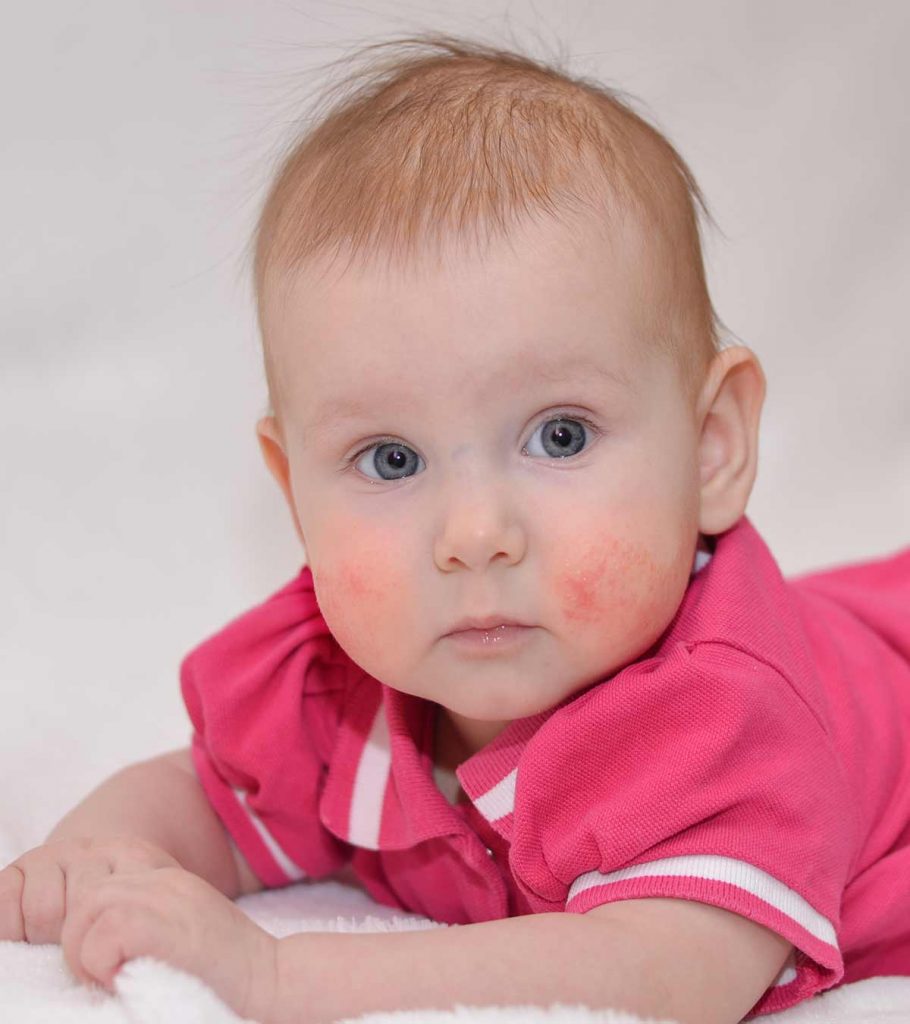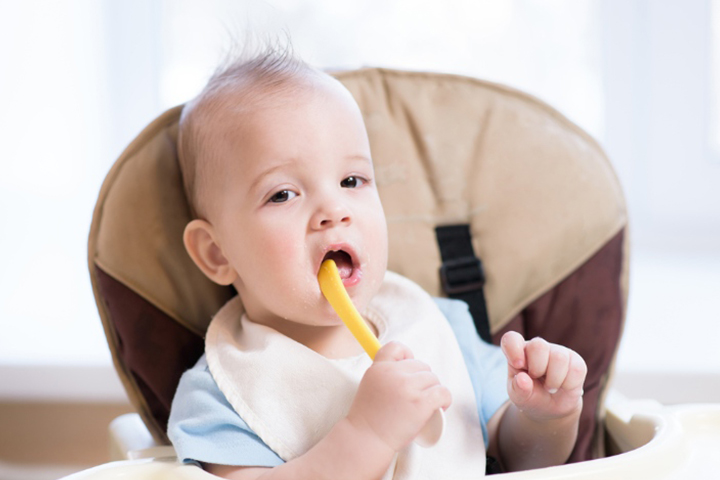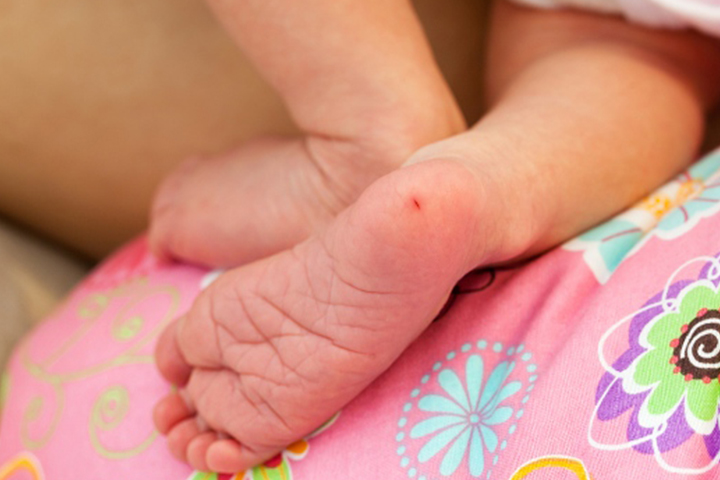Your baby will gradually begin a solid food diet, which will eventually become their primary nourishment source. It is good to know about the food allergies in babies before you introduce them to new foods or start giving them solid food. The most common food allergies in children include milk, peanuts, or eggs. Thus, it is important to know whether or not your baby has only nut allergies or is allergic to a particular food to prevent unwanted complications.
Read on to know about the causes, signs, and symptoms of food allergies in babies, their diagnosis, treatment, and preventative measures.
Why Does A Food Allergy Occur?
Food allergy happens when the body’s immune system mistakes food to be a pathogen and mounts an attack (1). It results in symptoms that are similar to disease but are actually caused by the faulty response of the immune system.
The mistaken identity is the result of certain chemical reactions in the body. Let’s take a look at how this happens.
What Causes Food Allergies In Babies?
The causes for food allergies or baby sensitivities are not fully known, but researchers believe that they develop from a combination of genetic and environmental factors.
Ingested food is processed by the stomach from where it moves to the small intestine. Here the food encounters the immune system’s cells present within the intestinal lining.
The food protein is incorrectly detected as a foreign substance (antigen), and the immune system releases a counter chemical (antibody).
A complex reaction between the antigen and antibody forms the chemical histamine, which reacts with the body tissue leading to visible external symptoms that we know as the food allergy. Peanuts and eggs are two of the most common food allergens. Sometimes, some raw fruits and vegetables can cause oral allergy symptoms.
If the baby is allergic to one food, then they are likely to be allergic to other related food items too. This phenomenon is called cross-reactivity (2). For example, if your baby is allergic to chamomile, then chances are that they could be allergic to milk thistle too.
What Are The High Allergy Foods For Babies?
Certain foods are responsible for the most common allergies in infants. The US Center for Disease Control and Prevention (CDC) states that the following food groups account for 90% of mild to severe food allergic reactions:
- Milk (from any animal source; breastmilk is safe)
- Eggs
- Fish
- Crustacean shellfish (such as prawns and crabs)
- Wheat
- Soy
- Peanuts
- Tree nuts (such as walnut and hazelnut)
These are the top allergenic foods for babies while seeds such as sesame and mustard, and even chocolate are potential allergens. The baby is more susceptible to food allergies under certain conditions.
What Are The Risk Factors For Food Allergy In Babies?
The chances of food allergy in the baby increase in the following situations (3):
- Family history of food allergies: The probability of food hypersensitivities is higher among infants, who have the problem in their family. The baby has a 30 to 50% chance of getting the allergy if one parent has it, and 60 to 80% chance if both the parents have an allergy (4).
- Age of the baby: Food allergies affect about 8% of infants below 36 months, but only 3% of adults (5). Infants are more vulnerable than adults due to their underdeveloped immune system.
- Asthma: It usually increases the risk of food allergy, but the link between the two is not known. Experts believe that if asthma is triggered by an allergen (for example, accidentally inhaling particles of wheat flour), then the person may be allergic to its oral consumption (wheat allergy) too (6).
- Presence of other allergies: A baby with other allergic conditions, such as eczema, has an increased susceptibility to a food allergy.
Do note that the above conditions only increase the chances of food allergy but do not necessarily lead to allergies. The baby may have the above issues yet be free of food allergy.
What Are The Symptoms Of Food Allergy In Babies?
An infant with food allergy is likely to display these signs:
- Skin hives: Red to pink rashes all over the body. The skin rash could be like a mosquito bite called welts or like a pinkish bump of skin called wheals. Rashes can be present all over the body, especially on the face, back, neck, and legs.
Hives are often itchy and cause discomfort to the little one. They can last for hours depending on whether the baby is given medication or not. Even a mild food allergy can lead to hives.
- Swelling of parts of the face: Lips, nose, eyelids, and tongue could be inflamed. Fingers and toes may also swell. Swollen areas of the body may be itchy.
- Runny discharge from the nose: A clear fluid could ooze out of the baby’s nose.
- Abdominal discomfort: It includes stomach cramps and sharp pain in the entire abdominal region.
- Vomiting and diarrhea: There might be diarrhea and vomiting, along with nausea.
- Lethargy and fussiness: The baby is less energetic, appears lethargic, and could get fussy.
Unlike popular belief, constipation and fever are not the symptoms of food allergy (7). A food allergy may manifest within a few seconds or after several minutes. In some rare cases, the baby might have a delayed reaction after four to six hours or even longer.
One such delayed reaction is food protein-induced enterocolitis syndrome (FPIES). This gastrointestinal symptom mostly occurs in young infants two to six hours after having milk, soy, grains, and a few other solid foods (8).
Severe food allergies in babies can lead to high-intensity symptoms. Such a state is called anaphylaxis or anaphylactic shock. Following are the symptoms of anaphylaxis:
- Tightening and narrowing of nasal respiratory tract
- Swollen neck muscles that put pressure on the windpipe
- Increase in heartbeat followed by sudden drop in blood pressure
- Dizziness and partial unconsciousness
- Blue coloration of skin and nails
- Reddish or deep brown stools due to the presence of blood (9)
Blood could appear in the stools in severe cases of food allergy and when the baby has other allergic conditions such as eczema. Anaphylaxis occurs in four out of ten cases of food allergies in infants (10). Take the infant to the doctor when you see the signs of food allergy.
How Is Food Allergy In Babies Diagnosed?
The doctor will study the symptoms and learn more about the baby’s medical history. Parents would be asked about the diet of the infant. The doctor might perform the following allergy tests on the baby (11):
- Blood test: A blood test will measure the quantity of antibody in the blood. The doctor will inquire about the baby’s diet in the past couple of hours and then assess the blood report to determine antibodies specific to the food item.
- Eliminating a food type: The doctor might ask you to eliminate one suspected allergic food item from the baby’s diet per week. If a relapse of allergy is not noticed after discontinuing the food item, then it could be considered the reason behind the allergy.
- Skin prick test: It is the fastest and most accurate method of determining the cause of the allergy. A small, diluted quantity of a suspected allergen is injected into the upper layer of the skin. If the infant presents mild symptoms of the allergy, then it could be understood that the baby is allergic to that substance.
The above tests are usually conducted together to pinpoint the allergenic food item. Skin tests are safe and not a matter of concern. However, if the infant has repeated anaphylaxis or allergic conditions such as eczema and asthma then the doctor might conduct only the blood test and elimination of a food test.
How Is Food Allergy In Babies Treated?
There is no definite baby food allergy treatment as there is no cure for food allergies (12). Tackling the symptoms helps provide relief, and there are two ways of doing it:
- Antihistamine medication:Allergy symptoms are treated with the use of oral antihistamine medication that can be given at home after doctor’s consultation. The baby would also be prescribed an epinephrine auto-injector. An epinephrine shot is used in the case of anaphylaxis and can be administered by the parent.
According to the American College of Allergy, Asthma & Immunology, it is important to have two doses of epinephrine available, as about 20 percent of individuals with food allergies may experience a severe reaction that can recur. Since there’s no data to predict who will need how many doses, speak to your doctor to ensure the safe use of epinephrine.
- Changes in diet: Avoiding the food substance that causes the allergy helps mitigate the problem. Carefully read the food labeling present on packaged and processed food products that are being included in your baby’s diet.
How To Manage Food Allergies In Babies?
Allergy management of your baby’s food is simple and usually involves a few steps:
- Choose hypoallergenic baby food: A hypoallergenic formula is recommended by the pediatrician when the baby is allergic to cow’s milk and relies only on formula for nourishment. Babies with cow milk allergy are usually allergic to soy as well, and thus cannot be given soy formula. Hypoallergenic formula could be a choice as it is made from hydrolyzed proteins, which are simpler amino acids that do not trigger allergic reactions (13).
- Avoiding food items with allergen derivatives: A cracker could contain soy flour while a pudding may contain egg. Allergens could be hiding in any food and parents should double check the ingredients before feeding it to the baby. Such prudence is necessary for older infants who can eat a variety of solid foods.
- Check vaccines before immunization: Most vaccines are safe for the baby, but a few such as influenza (flu) and yellow fever vaccines are derived from egg proteins – a common allergen (14). Yellow fever is not part of the usual immunization schedule of the baby, but influenza is widely recommended. Parents must discuss with the doctor about the flu vaccine before going ahead with it. A non-egg protein version of the vaccine may be used. It could be expensive, but completely safe for the baby with egg allergy.
When managed correctly with the right food items and diet, allergies do not hinder the baby’s healthy growth and development. Some interventions may also help reduce the chances of food allergies in babies.
How To Prevent Food Allergies In Babies?
There is no definite way of preventing food allergies since they happen spontaneously. Nevertheless, you can try the below:
- Have a gradual increase in the quantity. When it is time to let the baby eat such food, do not go straight to full servings. Instead, start with small quantities. For example, when introducing eggs, start by giving the baby a couple of scrambled egg pieces every day. Gradually increase the quantity over a few days. A controlled introduction helps gradually desensitize the baby’s immune system to an allergenic food.
- Introduce any single-ingredient infant foods between four and six months. This would typically include fruits (apples, pears, and bananas), vegetables (green vegetables, sweet potatoes, squash, and carrots) and cereal grains (rice or oat cereal) one at a time. Food can be introduced this way every three to five days. This slow process gives parents or caregivers a chance to identify and eliminate any food that causes an allergic reaction.
Note: Delaying the introduction of foods may increase your baby’s risk of developing allergies.
- Lactating mothers need not stay away from common allergenic foods to prevent allergies. If the baby has a confirmed food allergy, then the mother can avoid eating the allergenic food. However, it seldom has any effect, and in most cases, mothers can consume the allergen without it having any impact on the infant with allergy (15).
However, some mothers find eliminating common allergens from their diet to be helpful. An anonymous mother who has a baby with food allergies says, “My 9-month-old daughter is officially allergic to egg white, egg yolk, and dairy, and she definitely reacts when I eat corn, peanut, tree nuts, strawberry, and fish… Fussy Buns (her daughter’s nickname) was only 2 weeks old when she first developed a diaper rash that wouldn’t go away. It lasted over 6 months until I could finally identify and eliminate the problematic foods!… Against the allergist’s advice, I cut eggs out of my diet. Within days, we stopped seeing blood in her stool, but we could never quite get the diaper rash to clear up. So, I began to record her symptoms and keep a food journal to see if I could pinpoint another allergen. My naturopath suggested I also eliminate corn, and along the way, I have discovered the other foods that cause her to have a reaction (i).”
Food allergies occur when the body’s immune system treats a particular food item as a foreign body or antigen and hurls an immune attack. Substances causing food allergies in babies may include milk (other than breast milk), peanuts, eggs, and shellfish. Immature immune systems and family history of food allergies make babies more prone to such allergies. You could introduce solid food one item at a time and maintain a logbook to identify allergies. Consult your child’s pediatrician if your baby shows symptoms such as hives, runny nose, or swelling, which may indicate food allergies.
Key Pointers
- Babies most frequently experience allergies to milk, peanuts, wheat, shellfish, and soy.
- Babies under three years old, with asthma, other allergies, or a family history of allergies are at a higher risk of developing allergies.
- Vomiting, skin hives, diarrhea, stomach pain, lethargy, fussiness, and swelling of the lips, tongue, and eyelids are typical signs of food allergies in babies.
- Antihistamines and appropriate changes in diet can help manage food allergies in babies.














